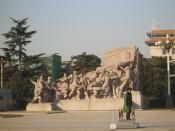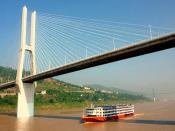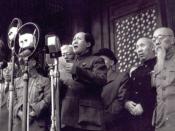The Great Leap Forward (1958-1961) had a vast impact on China and its people. Mao Zedong, leader of ChinaÃÂs communist party (1949-1973) aim in proposing the campaign was to ÃÂovertake all capitalist countries in a fairly short time, and become one of the richest, most advanced and powerful countries in the world.ÃÂ Mao wanted to modernise China and sought to enhance the availability of equipment such as nuclear submarines for ChinaÃÂs military. The programme had a mostly negative impact on ChinaÃÂs people as millions were subjected to starvation and malnutrition as a famine struck the nation in 1959 due to Mao wanting to increase export numbers in the country. It has been estimated that about 30 million people died during the Great leap Forward years. The Great leap forward also negatively impacted on ChinaÃÂs people (particularly peasants), as they were subjected to harsh labour from taking part in building projects such as dams and canals.
It also had a profound impact on ChinaÃÂs people as it left millions displaced and made many feel demoralised due to being stripped of their identity. However, the Great Leap ForwardÃÂs impact on ChinaÃÂs people was not completely negative as it educated people and allowed them to enhance their skills through working in factories.
The Great Leap Forward had a harsh impact on ChinaÃÂs people as millions were subjected to starvation and malnutrition due to Mao wanting to increase the number of exports in the country. Historians Jung Chang and Jon Halliday strongly believed that the Great Leap Forward had had a negative impact on ChinaÃÂs people as its increased number of food exports forced people to be deprived of their food. They clearly convey this in their biography about Mao by stating ÃÂgrain exports alone, almost exactly 7m tons would have provided the...



Hi
Just what i needed, Excellent essay
0 out of 0 people found this comment useful.